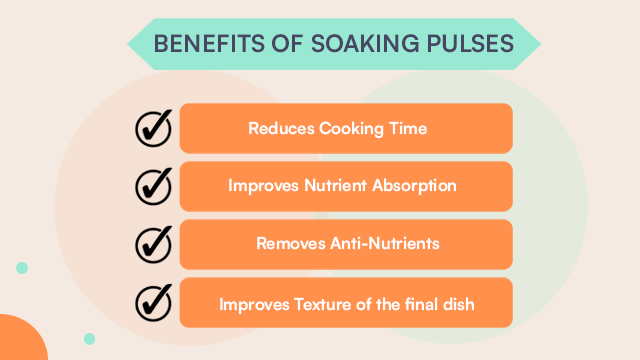
Indulge in the creamy goodness of white sauce pasta, a…

Tanusha is pursuing her graduation in psychology from IGNOU and has a diploma in hotel management specializing in culinary arts from NIPS, Ranchi.


Varleen Kaur is a Qualified Dietitian. In Fitelo, she is currently serving as a Subject Matter Expert, in the Department of Performance and Marketing.

With the invention of pressure cookers, people these days are usually not soaking pulses for the ideal period. Well, soaking pulses is still a common practice, but why should we soak pulses before cooking?
Pulses are included in a variety of dishes. When they are paired with another plant-based food, they make the meal a complete source of protein.
Soaking pulses have many benefits, and every type of pulse has its own soaking time, which makes them delicious. So, in this blog, we will understand the reasons why soak pulses before cooking and how to soak them correctly.


Pulses are rich in nutrients and offer a range of health benefits. They are part of a high protein diet, low in fat, and rich in complex carbohydrates. Moreover, they are rich in fiber, vitamins (such as folate), and minerals (including iron, potassium, and magnesium).

Soaking pulses before cooking is a common practice in many cuisines because it offers several benefits.
These benefits of soaking pulses answer the question well, why should we soak pulses before cooking? Sometimes, for specific recipes, pulses are fermented, so let’s understand the difference between fermented and soaked pulses.
Fermenting and soaking are two different processes that involve preparing pulses before cooking. The taste of fermented foods is a little different because of the fermentation process.
Here’s a comparison between fermented and soaked pulses:
| Fermented Pulses | Soaked Pulses |
| 1. Fermenting pulses means allowing them to undergo controlled fermentation by beneficial microorganisms like bacteria and yeast. | 1. Soaking means submerging them in water for a specific period before cooking. |
| 2. Fermentation takes several hours to several days depending on the type of pulses. | 2. Soaking time generally varies from several hours to overnight depending on the type of pulses. |
| 3. Fermentation gives a distinct tangy flavor to the pulses. | 3. Soaking activates the enzyme that breaks down phytic acid compounds which make the pulses soft. |
| 4. Fermentation helps to improve digestion by breaking down some complex carbohydrates and reducing anti-nutrients. | 4. Soaking reduces the cooking time of pulses which makes them soft and digestable. |
| 5. Fermentation improves the nutrient profile by increasing the bioactive compounds of vitamin B. | 5. Soaked pulses improve the texture of the final dish and become tender. |
| 6. The presence of lactic acid and other byproducts of fermentation inhibits the growth of harmful bacteria. | 6. Soaking helps to reduce bloating or gas. |


Soaking pulses correctly is a simple process that involves a few key steps. Here’s a step-by-step guide on how to soak pulses correctly.
1. Sort And Rinse: To begin with, remove the dirt, damaged beans, or any foreign object. Then rinse the pulses under cold, running water, this will remove any dust or impurities.
2. Choose A Soaking Method: There are two main methods for soaking pulses:
3. Add Water: Pulses will absorb a good amount of water, so add water 3 times to the quantity of pulses.
4. Cover And Let Soak: Now it is time to soak the pulses according to your desired soaking method.
5. Drain And Rinse: After the pulses are well soaked use a strainer to drain the water and rinse the pulses under cold running water. Now the pulses are ready to cook.
The soaking time for pulses can vary depending on the type and size of the pulse.
Soaking pulses before cooking is a simple yet transformative step. It greatly enhances the nutritional value, taste, and digestibility of pulses which explains why should we soak pulses before cooking.
As we’ve explored in this blog, soaking pulses helps to break down the anti-nutrients, reduces cooking time, and promotes better nutrient absorption. Taking the time to soak pulses, makes them easier to cook and contributes to our overall well-being.
The soaked pulses benefits extend beyond the kitchen, reaching into our digestive systems, and nutrient intake. So, the next time you plan to cook lentils, beans, or chickpeas, consider the extra step of soaking.
To justify the soaking method and its benefits, here is a dal soup recipe that you try with soaking and without soaking and distinguish the difference in taste, texture, and appearance of the final dish.
Soaking pulses before cooking reduces cooking time, improves digestibility, and enhances texture. The decision to soak depends on personal preference and the specific recipe.
Stick to cold or room temperature water for soaking the pulses. Using hot water may lead to undesirable effects like fermentation.


Contact Us Today
Your search to find the right guidance to be a part of all those fat-to-fit stories ends here. So, contact us today if you are looking for a diet plan with cheat meals. Also, we will discuss how we can help you achieve your weight loss goals.
Disclaimer
This blog post was written to help you make healthy and better food choices. So, be aware and take care. The most important thing to consider is your health before starting a restrictive diet. Always seek advice from a doctor or dietitian before starting, if you have any concerns.

Indulge in the creamy goodness of white sauce pasta, a…
 Whatsapp Us
Talk To An Expert
Whatsapp Us
Talk To An Expert